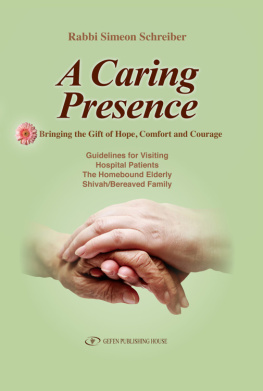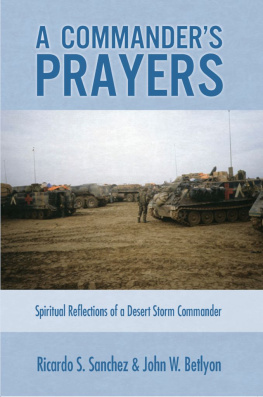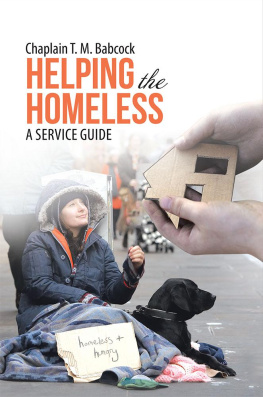A Caring Presence
Rabbi Simeon Schreiber
Bringing the Gift of Hope, Comfort and Courage
Guidelines for Visiting
Hospital Patients
The Homebound Elderly
Shivah/Bereaved Family

A Caring Presence
Rabbi Simeon Schreiber
Excerpt in appendix II reproduced from Making Sense of Suffering: A Jewish Approach by Yitzchok Kirzner, with permission from the copyright holders, Artscroll/Mesorah Publications, Ltd.
Copyright Simeon Schreiber
Jerusalem 2011/5772
All rights reserved. No part of this publication may be translated, reproduced, stored in a retrieval system or transmitted, in any form or by any means, elec- tronic, mechanical, photocopying, recording or otherwise, without express written permission from the publishers.
Cover Design: Michal Cohen
Typesetting: David Yehoshua
ISBN: 978-965-229-557-6
1 3 5 7 9 8 6 4 2
Gefen Publishing House Ltd.
6 Hatzvi Street
Jerusalem 94386, Israel
972-2-538-0247
Gefen Books
11 Edison Place
Springfield, NJ 07081
1-800-477-5257
www.gefenpublishing.com
Printed in Israel Send for our free catalogue
Library of Congress Cataloging-in-Publication Data
Schreiber, Simeon.
A caring presence : bringing the gift of hope, comfort and courage : guidelines
for visiting hospital patients, the homebound elderly, shiva/bereaved family /
Simeon Schreiber.
p. cm.
ISBN 978-965-229-557-6
1. Visiting the sick (Judaism) 2. Consolation (Judaism) 3. Jewish mourning customs. I. Title.
BM729.V5S37 2011 296.6'1--dc23 2011034176
Dedication

An accomplished woman, who can find? Her value is far beyond pearls. Her husbands heart relies on her and he shall lack no fortune.
She spreads her palm to the poor and extends her hand to the destitute. She opens her mouth with wisdom and a lesson of kindness is upon
her tongue. Many daughters have achieved greatly, but you have surpassed them all.
(Excerpted from Proverbs 31)

This book is dedicated with deep gratitude and appreciation by
Mr. Joseph Sirotkin
in honor of his devoted wife
Beverly
For more than sixty-three years Beverly has been his friend, confidante, and soul mate, giving him unconditional love, unwavering support, and unbounded loyalty.
Truly, through her commitment, she has earned the right to wear the crown of aishet chayil with pride.
In the merit of all of their noble deeds of charity and acts of kindness, may God bless Joseph and Beverly Sirotkin with many more years of physical health, spiritual tranquility, and the serenity of true shalom, peace, in every facet of their lives.
Foreword
The young man was just twenty-four years old when he decided to move to Israel to complete his masters degree in Near Eastern studies at Tel Aviv University. He had another dream as well: to serve in the armed forces of Israel, a country he deeply loved and admired.
When the letter arrived from the army medical office requesting that he return to their office immediately, he was elated and euphoric. His dream was about to come true. But he was not immediately accepted. He was told that he needed another set of chest X-rays because something didnt look right. No time to waste, they said, so he complied immediately. The doctor who read the X-rays was blunt in his diagnosis. In a cold Germanic voice he said, You have lymphoma. You will need chemotherapy. You will throw up a lot. Your hair will fall out. But you will be okay. You will have to be a man!
The young man began to cry. Suddenly, he was no longer an aspiring soldier. He was a frightened child in desperate need of his father.
The young man was my son Jacob.
Within three days of his diagnosis, I had him back in the United States, ready to undergo a battery of tests. Ultimately, we learned that he had developed Hodgkins disease, a sometimes fatal but often curable cancer.
And so began my involvement with the mitzvah of bikur cholimthe selfless and rewarding act of caring for others who are physically ill or emotionally distressed. Jacob struggled and, thank God, survived. (In fact, he is married and the father of a beautiful family!) In the process, we both learned a good deal about the mindset of illness and what visitors should and should not do.
Visiting those who are ill is a universal tradition, an act of kindness that is not reserved exclusively for the Jewish people. Every day, people of all nationalities and religious and spiritual persuasions visit their loved ones at home, in hospitals, or in nursing facilities, with the hope of bringing comfort and solace to them. Visiting the sick demonstrates that someone cares about someone elses well- being. It is an act of compassion that is always appreciated and never forgotten. Its motivation, however, is personal and derives from deep feelings of one individual for another.
The Jewish concept of visiting the ill bikur cholim is distinctly different: though it certainly can create personal benefit, its true mandate, according to the twelfth-century philosopher Maimonides, is the fulfillment of one of the principles written in the Torah, to love thy neighbor as thyself (Leviticus 19:18). This is because, in a deeper sense, it furthers tikkun olam: repairing the world and making it a better place in which to live. Viewed in this way, its focus is no longer on the individual; it is on the community. A healthy and spiritual community will be the catalyst for a better world for all of us.
But irrespective of its rationale, at its core is the fact that visiting the sick is a mitzvah, a good deed, a Torah instruction that can be performed by every individual.
As with many laws and customs in the Torah, there are both proper and improper ways to perform this mitzvah. Understandably, for many individuals, the fulfillment of bikur cholim is uncomfortable. When to visit, how long to stay, what to say, what topics to avoid, how to act in the presence of someone who is ill these are just a few of the areas of concern. It is my hope that this book, A Caring Presence, will provide the answers to these questions and many more.
It will attempt to answer what bikur cholim is and what it is not. The Biblical and Talmudic sources for the performance of bikur cholim will be discussed, sometimes utilizing novel approaches and interpretations. It will address what the mitzvah accomplishes for you, the visitor, as well as the patient. You will also learn about the many and varied emotions that the person you are visiting possibly may be experiencing and how to respond to them.
Through a scripted scenario, you will be taken on a virtual hospital visit. You will review the visit point by point and determine which of the visitors actions you consider proper and which improper. Then we will review the visit together and develop twenty- one guidelines for effective visits.
Finally, I will attempt to develop a meaningful insight: a theological response to patients who are suffering and feel that God does not hear them, that He is not listening to their prayers or has abandoned them.
It is my hope that you will read and reread this book until you are comfortable with its messages and advice. Its content is not meant to be inflexible or written in stone. It is intended strictly as a guide that can be amended according to your needs and abilities.











